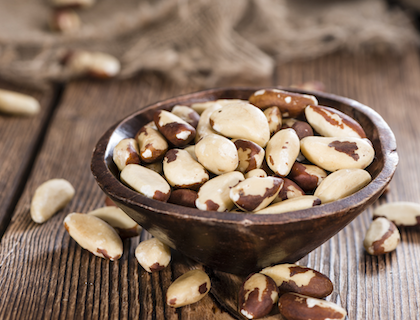
Mineral Alert: 7 Amazing Health Benefits of Selenium
By Claire Georgiou, Reboot Naturopath, B.HSc ND
Selenium is an important essential trace mineral and you may be missing out on it if you’re not eating enough of the right foods.
It’s important for immune strength particularly against viral infections, helpful for fertility, essential for liver detoxification, supports healthy cognition, modulates inflammatory responses, and acts as a powerful antioxidant against free radical damage. Selenium intake also influences the risk of cancer and autoimmune diseases including thyroid disease.
In general, selenium content is down in foods due to soil depletion and many people miss this valuable mineral when their diet is primarily processed foods. Low selenium status has been associated with increased risk of mortality, poor immune function, and cognitive decline.
The Recommended Daily Allowance (RDA) for selenium is 55 micrograms per day for adults. Pregnant and lactating women have a slightly higher need for selenium at 60 and 70 micrograms per day.
Here are some of the benefits and some ways to get more of this valuable mineral into your diet.
Did You Know? Selenium May Help…
1. Reduce the risk of cancer
There is growing evidence that higher Selenium intakes are associated with reduced cancer risk such a urinary, bowel, prostate and breast cancer. Interventions with Selenium have shown benefit in reducing the incidence and mortality from cancer specifically liver, prostate, colorectal and lung cancer, this benefit is strongest in people with the lowest selenium status and there is some evidence that it may also reduce the progression and reduce the likelihood of metastasis.
Some studies have shown that low dietary selenium intakes are associated with an increased risk of prostate cancer. A study demonstrated that men with a toenail selenium content that correlates with a dietary intake of approximately 159 mcg per day had a 65% lower risk of advanced prostate cancer, compared to men with an intake of 86 mcg per day.
2. Boost fertility
It has been long recognised that selenium is an essential trace mineral for successful reproduction, Selenium is required for healthy human sperm maturation and sperm motility and may reduce the risk of miscarriage.
3. Prevent free radical damage
Selenium helps to protect the DNA inside our cells from harm by acting as a powerful antioxidant, it is also necessary for the production of glutathione peroxidase, which acts to detoxify your body from harmful chemicals. Vitamin E and selenium act as a powerful synergetic nutrients that act to protect cellular health.
4. Improve thyroid health
Selenium has enzymatic and structural roles in the production of thyroid hormones and it is in the highest concentration in the thyroid gland than anywhere else in the body.
In patients with Hashimoto’s disease and in pregnant women with anti-thyroid antibodies, selenium showed to decrease these destructive antibody levels and improved the health of the thyroid gland. Interestingly pregnant women who were given selenium had significant decreases in the occurrence of postpartum thyroiditis while given in Graves’ disease selenium supported the normalization of the thyroid and provided a beneficial effect on mild inflammatory orbitopathy (bulging eyes).
Selenium has enzymatic and structural roles in the production of thyroid hormones and it is in the highest concentration in the thyroid gland than anywhere else in the body.
5. Fight viral infections
Adequate intakes of selenium has an important role in immune strength and helps to reduce the proliferation of viral infections. Selenium has been shown to help slow down the progression of HIV developing into AIDS. In cases of selenium deficiency, viral infections including influenza viruses can mutate more readily causing increased severity in illness.
6. Keep your heart healthy
Some evidence suggests that selenium blood concentrations are associated with reduced cardiovascular disease. Selenium may help to increase blood flow, reduce inflammation and reduce free radical damage thus reducing the incidence and severity of heart related diseases.
7. Reduce symptom of asthma
Observational studies have demonstrated that patients with chronic asthma may have lower levels of selenium. This study demonstrated the participants who took selenium experienced less asthma related symptoms then those who didn’t.
Selenium-Rich Foods:
- Brazil nuts, 1 ounce (6–8 nuts) 544 mcg
- Eggs, 1 large, 15 mcg
- Tuna, 3 oz, 92 mcg
- Wild salmon, 3oz, 40 mcg
- Sardines, 3oz, 45 mcg
- Mushrooms, 1 cup, 9 mcg
- Chia seeds, 1 oz, 16 mcg
- Sunflower seeds, 1oz, 15 mcg
- Spinach, 3 oz, 28 mcg
Certain health conditions can also increase your need for selenium, such as inflammatory bowel disease, celiac disease and other malabsorptive conditions along with immune system diseases, high alcohol intake, weight loss surgery and chronic viral infections.
Tips for Add More Selenium to Your Diet
- Consider adding chia seeds, sunflower seeds and spinach to your morning smoothie.
- Start your morning with two eggs scrambled with mushrooms and spinach.
- Add wild salmon, sardines or tuna to your salad for lunch, if you eat fish.
- Have a handful of Brazil nuts as an afternoon snack.
- Make a chia pudding for dessert topped with chopped Brazil nuts or sunflower seeds.